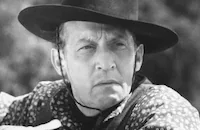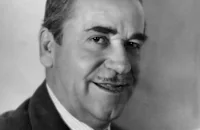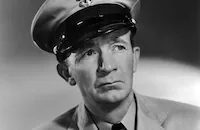Honeymoon Lane
Cast & Crew
William J. Craft
Eddie Dowling
June Collyer
Raymond Hatton
Ray Dooley
Noah Beery
Film Details
Technical Specs

Synopsis
Tim Dugan, a dealer at Castle Springs casino, the most successful gambling house in America, loves Mary Baggott, the niece of his boss, Tom Baggott. Tim proposes to Mary, defying Baggott and, with her encouragement, says he loves her, even though he dislikes such romantic talk. At the casino, when Tim deals his friend, Betty Royce, a hand that wins her $20,000, Baggott accuses Tim of cheating. When a note of thanks comes for Tim from Betty in which $2,000 is enclosed, Mary leaves in disgust, and her father orders him out of town. Tim goes to the nearby Hope Springs hotel, where he takes an immediate liking to the owner, Mother Murphy, whose employees have left because she cannot pay them, and offers to work as manager for free until he brings in customers. When the produce bill collector comes with a past due bill, Tim pays it with one of the $1,000 bills Betty sent him. He then sends a telegram to gambler Arnold Bookstein in New York suggesting he start a gambling casino at the hotel to rival Baggott's. Mother Murphy is shocked at the idea, however, and tells him that gambling was responsible for the death of her son. Thus chastized, Tim then proposes selling Mother Murphy's faith, her cherry pie and the hotel's curative spring waters. Bookstein, wanting to cut in on Baggott, arrives with two thugs, Dynamite Kelly and Noisy Palookus and plans to take over the hotel. He changes his mind, however, when Mother Murphy mothers him and cures him of his heart ailment. The King of Bulgravia, who is scheduled to stay at Baggott's hotel, decides he has had enough receptions and sends an impostor there instead. Tim finds the King and his underling, Paulino, stranded on the road after their taxi breaks down and takes them to Hope Springs. The King enjoys Tim's "American pep," being treated like a human being for the first time, and Mother Murphy's food, especially her cherry pie. After he reveals his identity, the hotel fills with customers who are anxious to see him. After Mary and Tim reconcile, an envious Baggott, claiming he has lost $15,000 in bad checks written by Mother Murphy's deceased son, threatens to close Mother Murphy's unless Tim is thrown out. Tim plans to leave despite Mother Murphy's objections and tells Mary he will send for her once he gets settled. Dynamite then brings $15,000 donated from Bookstein to pay the debt, after which Noisy and Gertie, Mother Murphy's rambunctious granddaughter, also bring $15,000 each. Baggott refuses to relinquish the checks until Dynamite threatens him. Baggott, however, leaves laughing with the $15,000 and reveals that the checks have been outlawed for two years. Paulino then reports that $15,000, the King's expense money, has been stolen from a drawer. After Dynamite surreptitously replaces the money in the drawer, the King finds the money and calls Paulino stupid. Following further shenanigans, Tim announces he is going to wed Mary. The King invites everyone to celebrate the wedding in his castle, hoping Mother Murphy will teach his chef her recipe for cherry pie.

Director
William J. Craft
Cast
Eddie Dowling

June Collyer

Raymond Hatton
Ray Dooley

Noah Beery
Mary Carr

Armond Kaliz
Adolph Milar
Lloyd Whitlock
George Kotsonaros
Corliss Palmer

Walter Brennan
Gene Lewis

Ethel Wales
Crew
Cliff Broughton
R. S. Clayton
M. E. Comerford
Norman W. Deming
Eddie Dowling
Eddie Dowling
Doris Drought
William R. Fox
James F. Hanley
James F. Hanley
Jack Jevne
Gene Lewis
Abe Meyer
Bill Moll
Barney Sarecky
William M. Vogel
William M. Vogel
Gilbert Warrenton
George W. Weeks

Film Details
Technical Specs

Quotes
Trivia
Notes
Eddie Dowling wrote and starred in the 1926 Broadway play. The Variety review noted that the "only resemblance this [film] bears to the Eddie Dowling musical hit of the same name is the title....The producers decided to dispense with a musical idea....Besides that Dowling rewrote the book entirely in an obvious attempt to modernize it with gambling and gangster stuff." Variety speculated that the music was discarded because musicals were unpopular at the time.












